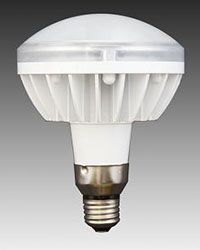 |
 |
E-News Update September 2010 |
LEAD FEATURE |
K2010 NEWS |
COMPANY NEWS |
MATERIALS NEWS |
MACHINERY NEWS |
EXHIBITION NEWS |
RUBBER JOURNAL ASIA |
INJECTION MOULDING ASIA |
Materials News
 |
First plastic LED lamp from Japanese collaborators
Lighting manufacturer Iwasaki Electric and chemicals supplier Teijin have jointly developed a completely plastic LED lamp that uses a high thermal conductivity resin, made by combining Teijin's Raheama material with PC, for the entire housing (except for the bayonet) instead of aluminium. Both companies have been working on the LED Eyelamp since 2009 and it will be commercialised by the end of this year.
Weighing 300 g, the same as a conventional self-ballasted mercury-vapour lamp, the new lamp boasts only a tenth of the power consumption of a mercury-vapour lamp. It is also said to be brighter and lasts 40,000 hours, roughly seven times longer than a conventional lamp.
While conventional self-ballasted mercury-vapour lamps are usually available in 3,100K, the new product comes in a warm coloured 3,000K model and a white 6,500K version.
Iwasaki expects initial annual sales of 30,000 lamps and is developing more product variations. With the new product, the company aims to expand applications for lighted signs, makeshift installations, factories and indoor facilities that require the performance, as well as for professional use by architects and lighting designers.
Teijin will further expand the market for Raheama in LED and other applications, aiming to sell several hundred tonnes annually by 2015. As the market further develops, the company hopes to increase production capacity in the future.
Lighting in outdoor signs and at work-sites mainly use self-ballasted mercury-vapour lamps, which do not require the ballast usually needed to turn them on. However, problems such as high power consumption remain. LED lamps feature low power consumption and long life, but since they generally use aluminium for heat dissipation, achieving adequate luminous flux usually results in excessive weight while heat generated by the LED may affect electric circuit components.
Teijin, making use of its proprietary technology, has developed Raheama and has sought ways to expand the applications for high thermal conductivity resin. Demand is increasing for advanced materials that help cool through heat dissipation, which is becoming an important means of raising efficiency and protecting operational integrity.
Teijin currently produces Raheama at its Iwakuni facility in Yamaguchi Prefecture, Japan, and is now preparing for full-scale production.
